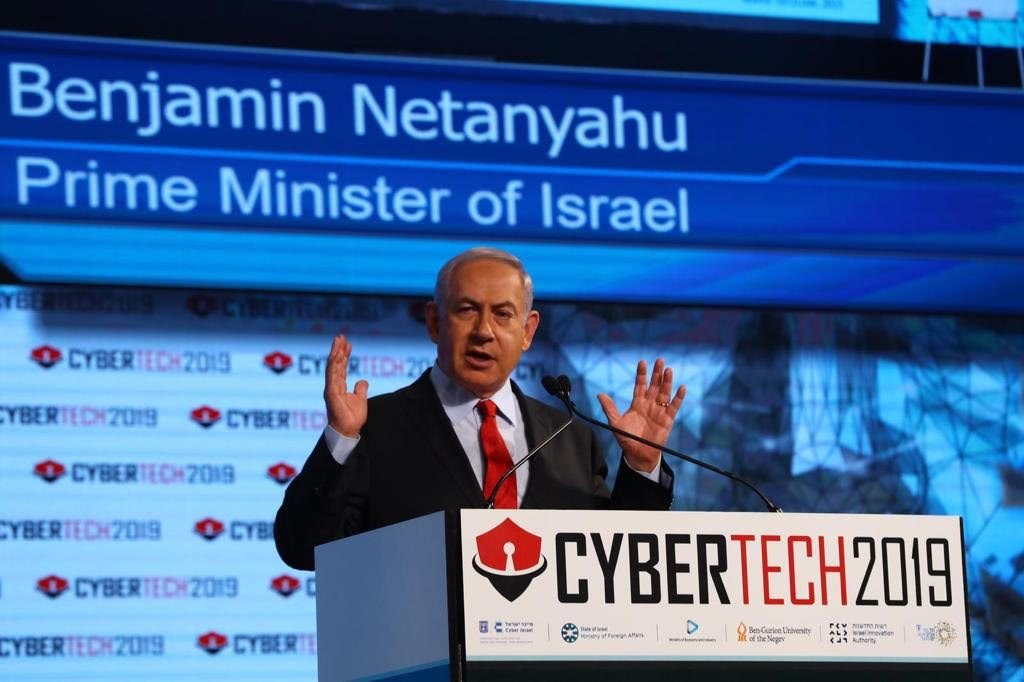Close collaboration is needed at the governmental, academic, corporate, and international levels to overcome the daily cybersecurity battle in every sector and the ever-changing cyber threats, said one speaker after the other at the 2019 Cybertech Conference in Tel Aviv on Tuesday.
From Israel’s prime minister to Romania’s minister of communications and information society, to the CEO of the Israel Innovation Authority, all voiced a shared message of the need for cooperation to keep cyber attacks at bay.
The biggest headline on Tuesday out of the event came from Israeli premier Benjamin Netanyahu who told the international gathering of decision-makers, government officials, industry executives, entrepreneurs, major venture capital investors, and representatives of advanced research centers, that Iran virtually attacks Israel every day.
SEE ALSO: Under Attack: Israeli Cyber Experts Warn Of Large-Scale Healthcare Hacks
“Iran is attacking Israel with cyber [attacks] on a daily basis. We follow it and prevent it every day,” Netanyahu told delegates at Cybertech 2019, the largest cybersecurity summit outside of the US, which runs January 28-30.
“The main issue is that every country can be attacked and respectively, every country needs the combination of defense and attack capabilities and Israel has such capabilities. Many countries want to be exposed to our knowledge of the cyber industry,” Netanyahu said.
Yigal Unna, Director General of the Israel National Cyber Directorate, told the audience that partnerships are critical in winning the cybersecurity battle.
Unna detailed a number of current and future cyber protection programs his office has been working on since he took the helm at the Israel National Cyber Directorate last year. Israel, he said, has taken significant measures to protect its critical infrastructure over the years and is further “determined to transform the industry into safe and relevant in cyber terms.”
To that end, the Cyber Directorate launched the 119 hotline, an emergency number site operators and representatives can call 24/7 if they suspect a cyber attack is ongoing. Israel is also set to launch a naval protection program with its Mediterranean neighbors by next year.
“We will strive to protect GPS systems and this year we shall dive deep into the medical industry and more. We strive to cooperate and make more partnerships from the understanding that maximum protection can’t come alone, as we are cooperating with more than 70 countries, [and] just in the last two days we signed agreement partnerships with both Lithuania and Australia. We must share information to improve, because that’s what the bad guys are doing,” Unna said.
Foreign interest in blue-and-white cyber
Foreign delegates make the annual Tel Aviv meetup a must-attend event, noting that Israel’s cybersecurity name is topnotch.
“Five years ago, cybersecurity concerned only governments and leaders. Since then, cyber attacks have become a national challenge, where no country is immune,” Lithuanian Prime Minister Saulius Skvernelis, said at the event in Tel Aviv. “This is Lithuania’s top priority…the cooperation with Israel was launched a few years ago. As a result, we agreed on an expansion of the cooperation.”
“Israel is definitely at the forefront of cybertech,” Romania’s Petrescu said during an interview on stage with Ruth Shoham, the executive director of the strategy and capacity building division at the Israel National Cyber Directorate.
But it wasn’t just government leaders praising Israel’s cyber forte.
Jon Soberg, managing partner at Menlo Park-based corporate venture capital firm MS&AD Ventures, told NoCamels that he came to the three-day Tel Aviv conference because “Israel is the best in the world in cybersecurity.” Soberg said he was on the lookout for cyber companies in which to invest.
Foreign investors have flocked to Israel for its cybersecurity know-how in recent years. In 2018, Israeli cybersecurity companies raised a record $1 billion in investments in 117 deals, with non-Israeli investors participating in 65 percent of them, according to a report published this week by Start-Up Nation Central. The sum constitutes nearly 20 percent of the overall cyber investments made worldwide in 2018, second only to the US.
“Israel is one-tenth of one percent of the world’s population and we are receiving 20 percent of the global share in private cybersecurity investments. That’s 200 times our weight in the world,” Netanyahu said at the event.
At Cybertech, the cyber offerings were impressive.
The main area of the convention hall included booths of experienced companies, government and security agencies including the Mossad, the IDF’s 8200 Unit, the Israel Police anti-fraud Lahav 433 Unit, the Innovation Authority, Check Point, CyberArk, IBM, RSA, Microsoft, Dell-EMC, Deloitte, Cybereason, Symantec, OPSWAT, FireEye, Intuit, Cyber Beat, Rafael, Aviation Industry, KPMG, PWC, SOMPO and others.
Sign up for our free weekly newsletter
SubscribeAt the back of the convention hall was a three-row deep section of cyber startups showcasing their algorithms and innovations for the field.
The main points at CyberTech 2019 were on how cyber affects our daily lives in health, transportation, infrastructure, and the economy, with special attention given to the fields of medicine, aviation, and elections.
“There is a serious imminent danger that Israeli elections will be tampered with. Israel needs to protect the integrity of its democracy,” said Erel Margalit, Founder and Executive Chairman of JVP.
Israel’s national elections are scheduled for April 9, marked this time Netanyahu’s legal troubles and speculation that he will be charged in a number of corruption cases alongside his wife.
Margalit shared his concerns that Netanyahu promoted an emergency order to transfer responsibility of information and data security from the Israeli Security Agency (ISA) to the Cyber Directorate, an organization subordinate to Netanyahu.
“A prime minister under criminal investigation cannot be given the sole responsibility to oversee the integrity of the general election,” said Margalit. “Netanyahu has the authority to order the Civil Cyber Authority of Israel to obtain information from the courts, prosecutor’s offices and about personal individuals and his political rivals. We must do better for the people of Israel and for global democracy.”
Unna also called on the need to protect the upcoming elections but seemed to dismiss Margalit’s reasoning. “Our focus is to prevent threats on the results, public opinion manipulations and more. We target hacking and infiltration of the electoral system, to keep them pure and clean as they should be. We are not the regulator committee, we are advisors and the election committee is in charge of the decisions,” he said.
Margalit, meanwhile, noted several examples of interferences in election campaigns in the United States, Germany, the United Kingdom and in France as a warning to Israeli voters. “We can see a pattern in each and every one of these countries, where an entity with external and foreign interests, joins a candidate or an entity with local interest in order to promote political and geo-political changes,” he said.
Rafael, BGN Technologies to keep safe advanced autonomous systems
And in other cyber news, a new collaboration between Rafael Advanced Defense Systems and BGN Technologies, the technology transfer company of Ben-Gurion University of the Negev (BGU), created a buzz at the conference. The strategic, multi-year research collaboration will see Rafael collaborate with BGU in a variety of fields, including cybersecurity, smart mobility, robotics, and artificial intelligence (AI).
This partnership follows Rafael’s decision to build an R&D center of excellence in Beersheba’s high-tech park, which is located adjacent to BGU. The new center will focus on different aspects of advanced autonomous systems.
“Rafael’s decision to have a significant presence at the high-tech park adjacent to BGU, together with the partnership signed today, is a clear indication of our researchers’ leadership in hardware and data related innovation,” Netta Cohen, chief executive officer of BGN Technologies, said at the signing ceremony. “We are looking forward to closely working with Rafael, a world leader in advanced defense systems, on a variety of cutting-edge projects in different disciplines.”
The first two projects will focus on exploring the risk of cybersecurity breaches in sensors of autonomous cars and how these threats might be mitigated.
“Cybersecurity is one of the biggest challenges in almost every aspect of modern-day life. This partnership will help support our advanced autonomous solutions, by working with prominent experts in the field,” said Dr. Ran Gozali, executive vice president and head of Rafael’s R&D and Engineering Division.
SEE ALSO: Israel’s Cyber Innovators Sign Off On Year Marked By Big Investments, Warn Of Dangers Ahead
The Rafael-BGN partnership is expected to create hundreds of jobs for engineers in Beersheba, already dubbed Israel’s cyber center.
As for looking ahead and guessing what threats lurk this year, Unna said challenges for the National Cyber Directorate include malicious evolvement of the cyber threat. “Critical infrastructures a decade ago were just traditional machines. Today, as we become more digital, our vulnerabilities are more exposed and therefore people’s trust has become more vulnerable over the years. These days we are exposed to more influencing campaigns on every topic. The bad guys have more channels of attack nowadays and growing by the hour, whereas a decade ago we knew the popular platforms for attack.”
“We see today more negative use of AI…. It was just a decade ago, where Israel was protecting its critical infrastructures with the Shin Bet (Israel Security Agency). While today, many organizations work together to achieve national security, which in my opinion puts us on the right path, as we are able to keep damages to critical infrastructures at zero. Our mission is to keep pushing Israel to the forefront of cybersecurity,” he explained.
Viva Sarah Press is a journalist and speaker. She writes and talks about the creativity and innovation taking place in Israel and beyond. www.vivaspress.com
Related posts

Editors’ & Readers’ Choice: 10 Favorite NoCamels Articles

Forward Facing: What Does The Future Hold For Israeli High-Tech?

Impact Innovation: Israeli Startups That Could Shape Our Future







Facebook comments